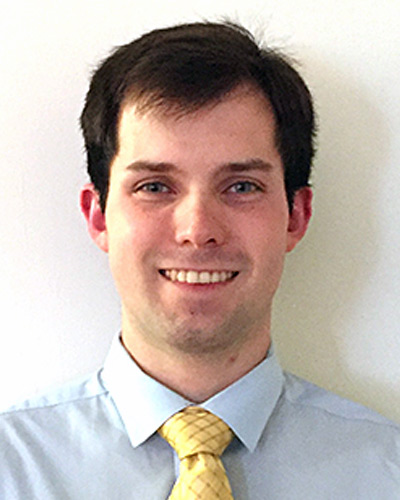Student Research Spotlight
Nicholas Hope (PsyD ’22)
August 26, 2020 After graduating with a Bachelor of Science in Human Development and Family Studies
from Pennsylvania State University and a Master of Education in Counseling Psychology
from Temple University, Nicholas Hope began studying for his Doctor of Clinical Psychology degree at Philadelphia College of Osteopathic Medicine (PCOM). His long-standing love of research pushed him to pursue opportunities to conduct
research relating to his chosen career path.
After graduating with a Bachelor of Science in Human Development and Family Studies
from Pennsylvania State University and a Master of Education in Counseling Psychology
from Temple University, Nicholas Hope began studying for his Doctor of Clinical Psychology degree at Philadelphia College of Osteopathic Medicine (PCOM). His long-standing love of research pushed him to pursue opportunities to conduct
research relating to his chosen career path.
What are you studying?
Recently, I worked on a project with Michelle Lent, PhD, associate professor, clinical psychology, wherein we studied bariatric surgery patients
who died postoperatively as a result of accidental overdose or intentional self-harm.
We were looking for patterns of characteristics among these patients to provide insight
into who may be at risk for overdose or self-harm after bariatric surgery for healthcare
providers working with these patients.
What prompted you to pursue research?
Although I am primarily focused on practicing psychology, research has been a very
important part of my professional training. Since completing my master’s degree, I
have wanted to have as many opportunities to be involved in research as I could. When
I met with Dr. Lent, I found her work to be extremely interesting and I was excited
to be a part of her team conducting research.
What experience do you have conducting research?
While in undergrad I was a research assistant with the Strengthening Families Program
at Penn State. While completing my master’s degree, I served as a research assistant
in oncology at the Children’s Hospital of Philadelphia. From there, I briefly served
as a research assistant at the University of Pennsylvania’s Adult Attention-Deficit/Hyperactivity
Disorder (ADHD) Center.
During my time at PCOM, I have worked with Dr. Lent as well as Brad Rosenfield, PsyD, practicum coordinator, clinical psychology, Stephanie Felgoise, PhD, chair, clinical psychology PsyD program, and Donald Masey, PsyD, clinical associate professor, clinical psychology, on various projects within the
realm of health psychology and neuropsychology. My current dissertation is focusing
on developing a brief cognitive-behavioral intervention aimed at addressing modifiable
risk factors to Alzheimer’s disease.
What were your responsibilities in this research project?
Essentially, I was responsible for reviewing patient data and records to collect information
on the characteristics that we were examining. These characteristics included age,
sex, time to surgery, weight loss expectations, postoperative weight loss, medication,
diagnoses, psychiatric histories (diagnoses, self-harm, suicidal ideation and behaviors,
medications, substance use, preoperative Beck Depression Inventory-II scores), pain,
social support, and reported life stressors. After this data was collected and recorded,
I worked with the team to write and edit the manuscript.
What is the broader impact of your research?
This research was focused on gaining a better understanding of any underlying risk
factors or patterns associated with self-harm and overdose so people with these risk
factors could be better monitored by their healthcare provider(s). Additionally, this
information would aid in the recruitment and evaluation of certain bariatric surgery
patients.
Learn more about research at PCOM and read about other student research highlights.
About Philadelphia College of Osteopathic Medicine
Established in 1899, Philadelphia College of Osteopathic Medicine (PCOM) has trained
thousands of highly competent, caring physicians, health practitioners and behavioral
scientists who practice a “whole person” approach to care—treating people, not just
symptoms. PCOM, a private, not-for-profit accredited institution of higher education,
operates three campuses (PCOM, PCOM Georgia and PCOM South Georgia) and offers doctoral degrees in clinical psychology, educational psychology, osteopathic
medicine, pharmacy, physical therapy, and school psychology. The college also offers
graduate degrees in applied behavior analysis, applied positive psychology, biomedical
sciences, forensic medicine, medical laboratory science, mental health counseling,
physician assistant studies, and school psychology. PCOM students learn the importance
of health promotion, research, education and service to the community. Through its
community-based Healthcare Centers, PCOM provides care to medically underserved populations.
For more information, visit pcom.edu or call 215-871-6100.
Contact Us
For general media inquiries, please contact the Office of Marketing and Communications
at 215-871-6300 or communications@pcom.edu. Visit our media relations page to view contact information for public relations personnel.
Connect with PCOM

 After graduating with a Bachelor of Science in Human Development and Family Studies
from Pennsylvania State University and a Master of Education in Counseling Psychology
from Temple University, Nicholas Hope began studying for his
After graduating with a Bachelor of Science in Human Development and Family Studies
from Pennsylvania State University and a Master of Education in Counseling Psychology
from Temple University, Nicholas Hope began studying for his 